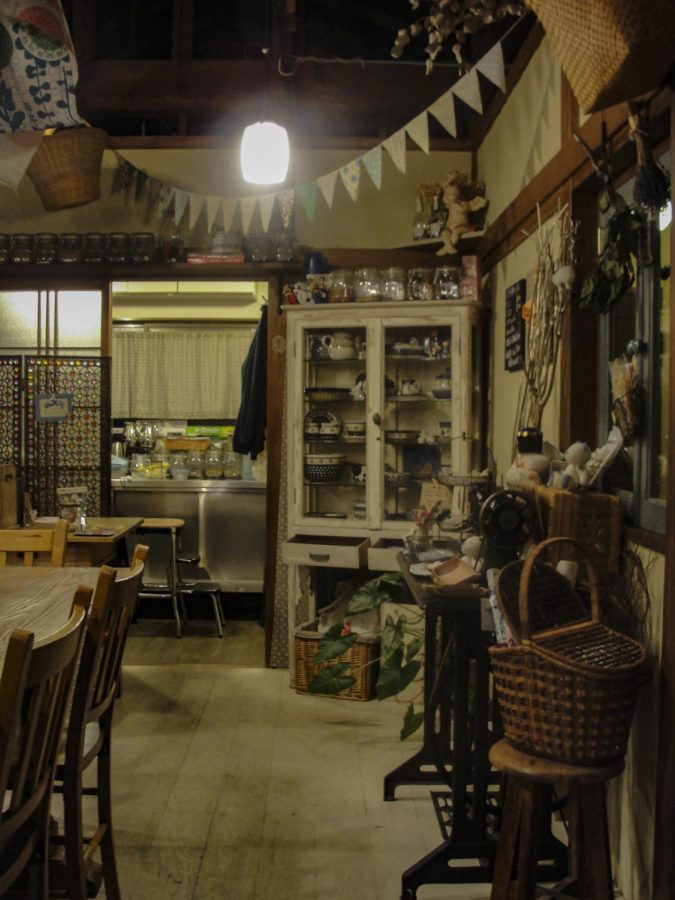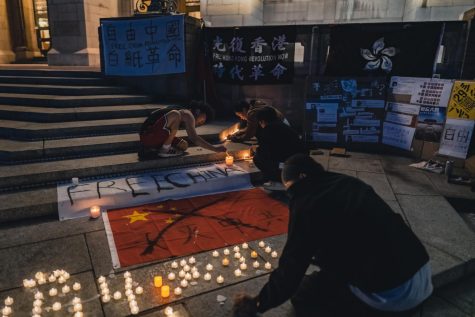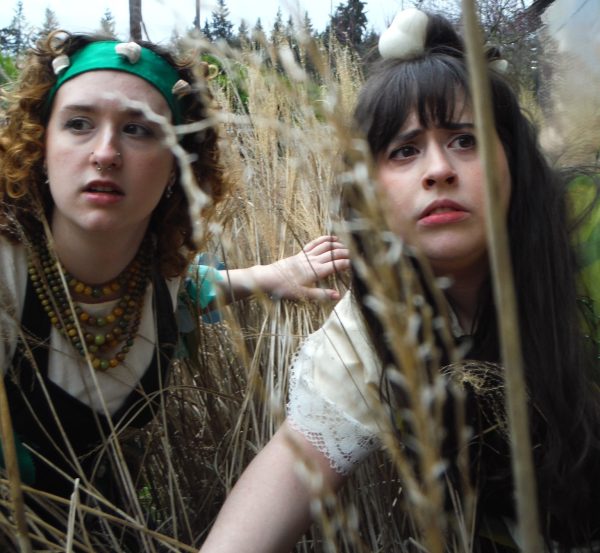The price of doing business- a Japanese perspective
Cafe Amnos is located in Tokyo, Japan.
The United States emphasizes the individual, whereas in Japan, others are more important than the self. This social thread is seemingly contradicted by Japan’s myriad of small, privately owned restaurants, where cooks and owners are one and the same.
In the U.S., it’s hard to find a store in a prime location that isn’t owned by a chain, let alone a store run by one person. In Japan, it’s not so unusual. Erina Uchida runs her own shop, making her a sort of restaurant auteur- she acts as chef, waitress and manager of Cafe Amnos. She has no other staff.
The cafe is a small, second-story room, with large windows on two sides and a narrow kitchen at the back. Cafe Amnos, meaning ‘lamb’, has tiny lamb figurines on all three tables. The cafe serves freshly made bagels, hot tea, coffee and a few meals. Most people who come in are regular customers.
The entire cafe has marks of personal investment. She and her husband painted the walls themselves and took out the ceiling, giving the place a farmhouse feel. Woven baskets hang from the exposed beams above. Wooden, glass-fronted china cabinets hold patterned dishes. A birdhouse sits in one corner, an antique typewriter in another. Several nutcrackers and Russian nesting dolls (seventeen, counting plushies) can be seen. A Bible sits on the low wooden table with the till. Uchida i a Christian, unusual in Japan, and the name of the cafe was inspired by the parable of the shepherd and the lost lamb.
The decorations are exactly to Uchida’s personal tastes- they started as her collection. “I love traveling. I often buy cute stuff for me,” she explains as she pulls down a book with Russian nesting dolls on the cover to show me. She bought it in the U.S.
The inspiration for the cafe is as personal as the decor. Nearly a quarter of a century ago, the Kobe earthquake made worldwide headlines and changed thousands of lives. Uchida was one of them. She lived in Kyoto, and visited Kobe for her job as a salesperson between kimono makers and stores that sold kimono. Kobe was her assigned region.
“After the earthquake, I couldn’t sell,” she said. When she visited her customers– the stores that bought kimonos – they only wanted to talk about the earthquake. Destroyed buildings could be seen outside train windows. Buses rode over uneven streets. If someone started crying in public, it would spread- others would begin to cry as well. No one wanted to buy kimonos.
So Uchida began to spend time away from her company and customers in a coffee shop. Inside was a different world, a place where people laughed. “I thought, the coffee shop is amazing.” Uchida described how the different context would change people. “They had experienced a big earthquake, but inside a coffee shop, they talk. They talk a lot . . . looks so fun,” Uchida explained. “It was so amazing for me.” She decided that she wanted to work at a coffee shop, or even eventually own one. “It’s fun, and also can bring some fun to the customer.”
She quit the kimono job, moved back to Tokyo and began work as a part-timer, practicing serving coffee. But profit margins are slim for coffeehouses everywhere in the world. “It is difficult to own one coffee shop . . . if you earn money, 1000 (yen) per hour . . . you have to sell two or three coffee.” She eventually quit the coffee job, and stopped thinking about owning her own store.
Uchida met and married her husband. For a while, her husband worked for a company, but due to the 2008 financial crisis and another earthquake, his salary was lowered twice, and he decided to quit his job. He wanted to be his own boss – he found his current location, a narrow two-story, and set up his ramen shop. “Upstairs, it was empty.” So, of course, Uchida thought, “I can do something!” For two years, she helped her husband in his shop, before moving upstairs.
Why can small shops like this be found in Japan without much trouble? At first glance, the U.S.’s individualist bent seems to fit more cleanly into the proliferation of these small, specialized restaurants. Shops that specialize in one or a few particular food items aren’t uncommon in Tokyo. Uchida says these are often family businesses, sometimes even third or fourth generation. Owning your own shop is also common dream for stressed company workers.
Space may be a prime reason for the survival of these auteur businesses. Uchida’s cafe has only a few tables, and her husband’s ramen shop has only eight seats. Smaller spaces means lower rent, a potentially make-or-break cost for a small business. Small venues may simply be more available in Japan, where population density forces creative usage of space. The paperwork to start her cafe also wasn’t particularly difficult – she just needed to a food seller’s license, which only required her to pay, provide some documents and attend a half day class. “It’s easy to get,” she said.
There may also be a less tangible——— reason. There are more Michelin-starred restaurants in Tokyo than in Paris. Most people evacuate during a typhoon. Mr. Uchida stayed in his ramen shop. Dedication to the service you provide- an expectation of dedication to the things you do for others, regardless of what that service is- may be the cultural current that buoys these small shops. A person’s work is not just a thing they do – it reflects on them, on who they are, and on how others see them. If a person wants to deliver absolute excellence in every grilled vegetable skewer, it may not be silly to be dedicated to something so small. Maybe success can be found in any task done well.
Uchida doesn’t really want to teach what she does to more staff, and not just because of the slim margins made by coffee shops. The recipes are her own, and she says it would be odd to have someone else make them. Her husband has a part-timer, but he finds it difficult to get someone to his level. Dedication makes for good food anywhere in the world, but perhaps that dedication is rewarded most in Japan.
The United States emphasizes the individual, whereas in Japan, others are more important than the self. This social thread is seemingly contradicted by Japan’s myriad of small, privately owned restaurants, where cooks and owners are one and the same.
In the U.S., it’s hard to find a store in a prime location that isn’t owned by a chain, let alone a store run by one person. In Japan, it’s not so unusual. Erina Uchida runs her own shop, making her a sort of restaurant auteur- she acts as chef, waitress and manager of Cafe Amnos. She has no other staff.
The cafe is a small, second-story room, with large windows on two sides and a narrow kitchen at the back. Cafe Amnos, meaning ‘lamb’, has tiny lamb figurines on all three tables. The cafe serves freshly made bagels, hot tea, coffee and a few meals. Most people who come in are regular customers.
The entire cafe has marks of personal investment. She and her husband painted the walls themselves and took out the ceiling, giving the place a farmhouse feel. Woven baskets hang from the exposed beams above. Wooden, glass-fronted china cabinets hold patterned dishes. A birdhouse sits in one corner, an antique typewriter in another. Several nutcrackers and Russian nesting dolls (seventeen, counting plushies) can be seen. A Bible sits on the low wooden table with the till. Uchida i a Christian, unusual in Japan, and the name of the cafe was inspired by the parable of the shepherd and the lost lamb.
The decorations are exactly to Uchida’s personal tastes- they started as her collection. “I love traveling. I often buy cute stuff for me,” she explains as she pulls down a book with Russian nesting dolls on the cover to show me. She bought it in the U.S.
The inspiration for the cafe is as personal as the decor. Nearly a quarter of a century ago, the Kobe earthquake made worldwide headlines and changed thousands of lives. Uchida was one of them. She lived in Kyoto, and visited Kobe for her job as a salesperson between kimono makers and stores that sold kimono. Kobe was her assigned region.
“After the earthquake, I couldn’t sell,” she said. When she visited her customers– the stores that bought kimonos – they only wanted to talk about the earthquake. Destroyed buildings could be seen outside train windows. Buses rode over uneven streets. If someone started crying in public, it would spread- others would begin to cry as well. No one wanted to buy kimonos.
So Uchida began to spend time away from her company and customers in a coffee shop. Inside was a different world, a place where people laughed. “I thought, the coffee shop is amazing.” Uchida described how the different context would change people. “They had experienced a big earthquake, but inside a coffee shop, they talk. They talk a lot . . . looks so fun,” Uchida explained. “It was so amazing for me.” She decided that she wanted to work at a coffee shop, or even eventually own one. “It’s fun, and also can bring some fun to the customer.”
She quit the kimono job, moved back to Tokyo and began work as a part-timer, practicing serving coffee. But profit margins are slim for coffeehouses everywhere in the world. “It is difficult to own one coffee shop . . . if you earn money, 1000 (yen) per hour . . . you have to sell two or three coffee.” She eventually quit the coffee job, and stopped thinking about owning her own store.
Uchida met and married her husband. For a while, her husband worked for a company, but due to the 2008 financial crisis and another earthquake, his salary was lowered twice, and he decided to quit his job. He wanted to be his own boss – he found his current location, a narrow two-story, and set up his ramen shop. “Upstairs, it was empty.” So, of course, Uchida thought, “I can do something!” For two years, she helped her husband in his shop, before moving upstairs.
Why can small shops like this be found in Japan without much trouble? At first glance, the U.S.’s individualist bent seems to fit more cleanly into the proliferation of these small, specialized restaurants. Shops that specialize in one or a few particular food items aren’t uncommon in Tokyo. Uchida says these are often family businesses, sometimes even third or fourth generation. Owning your own shop is also common dream for stressed company workers.
Space may be a prime reason for the survival of these auteur businesses. Uchida’s cafe has only a few tables, and her husband’s ramen shop has only eight seats. Smaller spaces means lower rent, a potentially make-or-break cost for a small business. Small venues may simply be more available in Japan, where population density forces creative usage of space. The paperwork to start her cafe also wasn’t particularly difficult – she just needed to a food seller’s license, which only required her to pay, provide some documents and attend a half day class. “It’s easy to get,” she said.
There may also be a less tangible——— reason. There are more Michelin-starred restaurants in Tokyo than in Paris. Most people evacuate during a typhoon. Mr. Uchida stayed in his ramen shop. Dedication to the service you provide- an expectation of dedication to the things you do for others, regardless of what that service is- may be the cultural current that buoys these small shops. A person’s work is not just a thing they do – it reflects on them, on who they are, and on how others see them. If a person wants to deliver absolute excellence in every grilled vegetable skewer, it may not be silly to be dedicated to something so small. Maybe success can be found in any task done well.
Uchida doesn’t really want to teach what she does to more staff, and not just because of the slim margins made by coffee shops. The recipes are her own, and she says it would be odd to have someone else make them. Her husband has a part-timer, but he finds it difficult to get someone to his level. Dedication makes for good food anywhere in the world, but perhaps that dedication is rewarded most in Japan.










